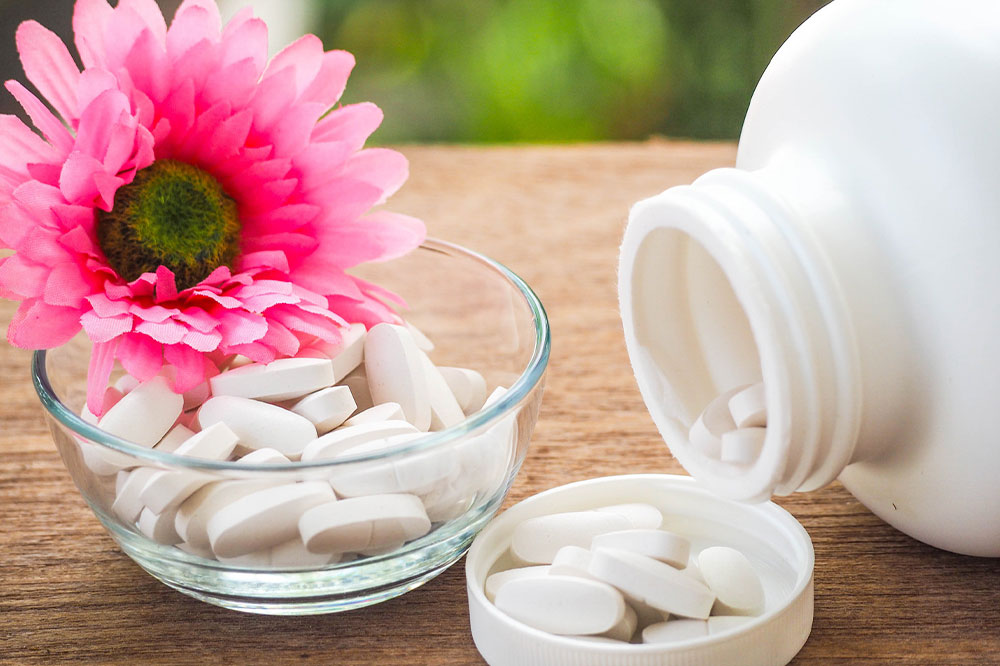9 Supplements That Help Manage Eczema Symptoms

Atopic dermatitis or eczema is a skin disorder characterized by itchy and inflamed skin. Various environmental factors or allergens are known to cause this condition. Eczema is usually treated through antibiotics and moisturizing creams. However, healthcare experts will also suggest nutritional and lifestyle changes to cope with the symptoms. Keep reading to learn more about nutritional supplements that can help enhance the meal plan and keep eczema symptoms at bay.
Whey protein
Usually, whey protein is used by athletes, bodybuilders, or people looking to increase their protein intake and gain muscle mass. Protein deficiency can impact a person’s general health in several ways. Eczema is one such resultant complication. The lack of protein in the skin layer during the early stages of growth can make one prone to immunodeficiency diseases like atopic dermatitis. During the first year of birth, the deficiency of filaggrin, a protein that keeps the skin cells together, allows allergens and irritants to enter the skin quickly. This protein deficiency can be supplemented through whey intake. Regular intake of partially hydrolyzed whey protein during the initial year of growth might help prevent eczema.
Coconut oil
Coconut oil has multiple health benefits and can help manage skin irritation in eczema patients. Common symptoms of eczema include dryness, itching, redness, bleeding, and blisters in the skin. Coconut oil contains lauric acid, which can help with blisters and cold and dry skin. When applied to the skin, coconut oil moisturizes it and prevents dryness. Skin dryness is a very early symptom of eczema. Even if applied on affected skin or areas of bleeding, itching, or inflammation, coconut oil reduces irritation and soothes the skin. Regular application on your skin can help reduce the pain caused by itching and reduce the chances of infection.
Fermented milk
Fermented milk is milk already half broken down by bacteria. This milk can be easily digested and is rich in proteins. Fermented foods have proven to improve skin quality, making it hard for external allergens to attack. Drinking fermented milk every week can prevent eczema symptoms from recurring.
Zinc supplements
Zinc plays a crucial role in healing wounds and reducing inflammation. It is a common remedy for skin conditions like leprosy, acne, and warts because zinc contributes to a proper immune function. One of the reasons for eczema is the lack of immunity against irritants. Regular intake of zinc supplements will help the body maintain a sound immune system. In addition, it will help patients manage the symptoms and soothe the burns and inflammations caused by eczema.
Vitamin D supplements
Vitamin D is essential for maintaining the calcium balance in bones and keeping them strong. Most of the vitamin D in our body is produced by our skin due to its exposure to sunlight. However, people who spend most of their time indoors are prone to vitamin D deficiency. People with vitamin D deficiency or low levels of vitamin D have a high risk of being affected by eczema. Thus, maintaining healthy vitamin D levels is necessary o keep such conditions at bay. Taking vitamin D supplements daily and regular sunlight exposure helps manage eczema.
Vitamin E supplements
If eczema is inconsistent and occurs at intervals, the scars and inflammations caused might remain for a long time. Dryness and itching make a patient’s skin swell outside and inside the layers. The excessive production of oxygen molecules causes this inflammation in the skin as an immune response. Since the skin barrier of eczema patients are weak, external microorganisms keep entering, and the immune response of producing oxygen molecules strengthens with time. Vitamin E is a known antioxidant that can reduce the production of these oxygen molecules and keep inflammation under control. Vitamin E is most commonly found in vegetable oils and cooking oils. Besides preventing inflammation, vitamin E supplements can relieve eczema patients of other irritating symptoms like itching, redness, and swelling.
Honey
Fresh honey produced by bees and collected naturally is antibacterial. The antibacterial and anti-inflammatory properties of honey make it suitable for treating wounds. Even though it can be sticky, it heals wounds faster and keeps open cuts unaffected by bacteria. Skin affected by eczema is likely to have scars and rashes. Applying honey over the skin can protect it from further bacterial attacks and enable the wounds to heal faster. The texture of honey is also thick, helping the skin retain its moisture; therefore, applying honey over your skin after a shower or after applying a moisturizer is advisable.
Oats
Oatmeal is a food option commonly suggested for people looking to lose unhealthy body mass. Grinding this oat grain into powder and mixing it with your bath water can help with eczema. Oat grains contain antioxidants, which reduce inflammation in your skin. Besides that, taking a good oatmeal bath will help your skin retain moisture. One can add ground oat powder to daily baths in the required amounts. Since this is a topical treatment, it can be used on children and adults and usually does not involve side effects.
Fish oil
Fish oil contains omega-3 fatty acids, which can soften dry skin. Fish oil is commonly used while cooking. However, if patients feel nauseous while smelling the oil or the food cooked using it, they can consider prescription fish oil, which can be taken after meals. Daily intake of fish oil boosts the skin’s immunity. More immunity gives the skin resistance against dust and microbe attacks.
While health experts suggest prescriptions and treatment plans to avoid the symptoms and recover from the condition, other options can also help. The supplements mentioned above are alternatives for prescription treatments that have proven helpful. Since there is no definite cure for eczema, the types of supplements used to manage pain, irritation, and other symptoms will vary between individuals. Therefore, it is always best to choose a convenient and harmless supplement depending on the severity of the condition.


